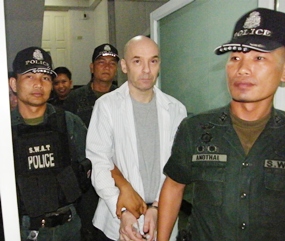
Fifteen years after allegedly chopping up
his wife in a Pattaya hotel, Canadian Michael Karas is finally escorted
into a jail in Pattaya.
Boonlua Chatree
Fifteen years after allegedly chopping up his wife in
a Pattaya hotel, Canadian Michael Karas is finally behind bars in
Thailand after losing his epic battle against extradition.
Now 55, the man known in his late 30s in Pattaya as
“Morgan Miles” was taken into custody by Pattaya Police Superintendent
Nanthawut Suwanla-ong Sept. 9 as he was taken off a Thai Airways flight
at Suvarnabhumi International Airport.
He will now face charges he killed 27-year-old
Suwannee Ratanaprakorn Sept. 24, 1996 at the former Bay Beach Hotel,
then dismembered her body with an electric saw before dumping her parts
in a field next to the Flybird Condominium on Soi 17.
Karas managed to flee the country before her body was
discovered and Thai officials initially issued an arrest warrant under a
second pseudonym, Michael Morgan. Canadian officials eventually drilled
through the false identities and determined Morgan and Miles were, in
fact, Karas. They put him behind bars not for the alleged murder, but
for Canadian parole violations from an earlier bank robbery conviction.
He remained there due to the extradition request, but
neither Canadian nor Thai police imagined it would take 15 years to sort
out.
In the past decade and a half, Karas has become the
poster boy for a Canadian legal system that critics claim has made the
North American nation a safe haven for pedophiles, murderers and other
criminals. While Karas finally was shipped back to Thailand, the Kingdom
still fighting for the return of Orville Mader, an accused pedophile now
free on bail in Canada who is wanted in both Pattaya and Cambodia for
molesting children as young as 9.
Both Mader and Karas, ironically, were represented in
their extradition battles by the same attorney.
Thai officials also have been trying since 1998 to
extradite Rakesh Saxena, a financier whose alleged embezzlement of 2
billion baht from the Bangkok Bank of Commerce allegedly sparked the
country’s 1997 financial crisis.
While most governments usually complete requests for
extradition within six months to two years, Canada - which Thais say is
the slowest among 26 countries they deal with - can take decades.
Canadian law provides a host of options and “protections” against
extradition and the country’s Supreme Court has created new loopholes.
Suspects can challenge how evidence was gathered and criticize the
governments, courts, prisons and punishments of requesting states.
In Karas’ case, he challenged Thailand’s human rights
record and the fact that Thailand, unlike Canada, would subject him to
the death penalty if convicted.
Canadian law enforcement eventually dropped its
demand that Thailand give Karas a “no death penalty” pledge, saying the
case’s high profile made such a ruling unlikely. However, the courts
weren’t so sure. An appeals court in 2008 said officials had overstepped
their bounds and further added that it believed Pattaya police lacked
the evidence to warrant a murder charge and refused to extradite Karas
unless the charge was dropped to manslaughter.
The battle continued for three more years, eventually
reaching the Canadian Supreme Court. At the same time, Karas tried six
times to be set free on bail. Those requests were refused as judges
determined he remained a flight risk. In October last year Karas finally
dropped his attempts to be released on bail and in July abandoned his
efforts to have the extradition face continued judicial review.
Despite the years, a stack of evidence awaited Karas
as he returned to Pattaya.
Police at the time said they found bloodstains on the
mirrors in the room and on the rubber bath mat. Police believed that the
killing was committed in the bathroom and was well planned, as the
suspect did not use any of the hotel’s towels or bed clothing, but had
obtained his own.
Hotel staff said they saw Karas check out of the
hotel at 5 a.m. Sept. 24, carrying a large suitcase, which he pushed to
a waiting baht bus. The clerk said he did not know what was in the
suitcase, but that it looked very heavy. The couple allegedly also had a
private home near the site where the body was found.
Suwannee had moved to Pattaya two years before her
death from Ubon Ratchathani to work in a bar. She brought Karas back to
meet the parents four months later and soon married. The victim’s father
said in 1996 Karas claimed he was a computer technician and was a quiet
man who always seemed preoccupied.
The two moved to Canada, but returned for a holiday
in 1996. Karas reportedly was jealous of the attention his wife
attracted in the city and police claim the jealousy prompted her
killing.

